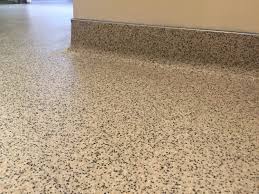In today’s fast-paced world, choosing the right flooring for residential or commercial spaces can be a daunting task. With various options available, it’s essential to consider durability, aesthetics, and functionality. Among the many flooring solutions, quartz resin floors have emerged as a top contender due to their impressive qualities. This article will explore the advantages, installation process, maintenance, and applications of quartz resin floors, helping you understand why this material is becoming increasingly popular in modern design.
What Are Quartz Resin Floors?
Quartz resin floors, also known as epoxy quartz flooring, are a type of seamless flooring made from a combination of natural quartz aggregates and resin-based binders. The resin is typically an epoxy or polyurethane, which is mixed with finely ground quartz crystals. This mixture is then applied to floors, creating a strong, durable, and aesthetically appealing surface.
The quartz aggregate gives the floor a unique texture and appearance, while the resin provides the necessary adhesion and strength. This fusion of materials results in a flooring solution that is not only robust and long-lasting but also versatile in terms of design.
Advantages of Quartz Resin Floors
- Durability and Strength
Quartz resin floors are known for their exceptional durability. The combination of resin and quartz creates a tough surface that can withstand heavy foot traffic, machinery, and even impacts. These floors are resistant to abrasion, scratches, and stains, making them ideal for both residential and commercial applications. Their durability also extends to extreme conditions, such as high temperatures or exposure to chemicals, making them suitable for industrial environments.
- Seamless and Hygienic
One of the standout features of quartz resin floors is their seamless nature. Unlike traditional flooring options that require grout lines or seams, quartz resin floors are applied as a continuous layer. This lack of joints or seams reduces the possibility of dirt, dust, or bacteria accumulating in hard-to-reach areas. As a result, quartz resin floors are much more hygienic, making them an excellent choice for healthcare facilities, kitchens, and food processing plants.
- Aesthetic Appeal
Quartz resin floors come in a wide range of colors, patterns, and finishes. Whether you’re looking for a sleek, glossy finish or a matte, textured surface, quartz resin floors can be customized to match any design scheme. The natural beauty of quartz aggregates gives the floors a unique, speckled look that can mimic the appearance of polished stone, making them aesthetically pleasing in any setting.
- Low Maintenance
Another advantage of quartz resin floors is their ease of maintenance. The seamless surface makes it easy to clean and maintain, as there are no grout lines or joints to trap dirt. Regular sweeping and mopping are usually sufficient to keep the floor looking pristine. Furthermore, quartz resin floors are resistant to staining from liquids, oils, or food spills, which makes them particularly low-maintenance in high-traffic areas like kitchens, workshops, and commercial spaces.
- Slip Resistance
Quartz resin floors are highly slip-resistant, making them an excellent choice for environments where safety is a top priority. The texture of the quartz aggregate provides extra grip, even when the floor is wet. This characteristic is particularly beneficial in industrial and healthcare settings, where slips and falls can lead to serious injuries.
Installation of Quartz Resin Floors
The installation process for quartz resin floors involves several key steps to ensure a smooth and durable finish:
- Surface Preparation: The existing floor surface must be thoroughly cleaned and prepared. Any cracks, holes, or imperfections are repaired before applying the resin. The surface is often sanded or shot-blasted to improve adhesion.
- Mixing the Resin and Quartz: The resin binder and quartz aggregate are carefully mixed to form a uniform blend. This mixture is then applied to the prepared floor using a trowel or a squeegee.
- Application and Curing: The resin and quartz mixture is spread evenly across the floor surface and left to cure. Curing time can vary depending on the type of resin used, temperature, and humidity conditions. Once the resin has fully set, the floor becomes hard and durable.
- Finishing Touches: After the resin has cured, the floor can be sanded and polished to achieve the desired finish. A topcoat may also be applied for extra protection and enhanced aesthetic appeal.
Maintenance Tips for Quartz Resin Floors
While quartz resin floors are low-maintenance, regular care can help maintain their appearance and extend their lifespan. Here are some simple maintenance tips:
- Routine Cleaning: Sweep or vacuum the floor regularly to remove dirt and debris. Use a damp mop with a mild detergent to clean the floor. Avoid harsh chemicals that could damage the surface.
- Protect from Heavy Impacts: Although quartz resin floors are highly durable, avoid dropping heavy objects on the surface to prevent any possible damage.
- Regular Inspections: Periodically check the floor for any signs of wear or damage. If you notice any cracks or chips, they should be addressed promptly to avoid further deterioration.
- Avoid Abrasive Cleaners: Using abrasive cleaning tools or harsh chemicals can scratch or damage the resin surface. Stick to non-abrasive cleaners and soft cloths or mops.
Applications of Quartz Resin Floors
Quartz resin floors are suitable for a wide variety of applications, both residential and commercial. Here are some common areas where this flooring solution is used:
- Commercial and Industrial Spaces: Due to their strength and resistance to chemicals, quartz resin floors are ideal for factories, warehouses, and laboratories. They can withstand heavy machinery, high foot traffic, and exposure to chemicals.
- Healthcare Facilities: The seamless, hygienic, and slip-resistant qualities make quartz resin floors a popular choice for hospitals, clinics, and other healthcare settings where cleanliness and safety are paramount.
- Retail Stores and Showrooms: The aesthetic appeal of quartz resin floors makes them an attractive option for retail spaces. The customizable colors and finishes allow businesses to create a unique ambiance that complements their branding.
- Kitchens and Food Processing Plants: Quartz resin floors are resistant to oils, liquids, and food stains, making them perfect for kitchens, restaurants, and food processing facilities.
- Residential Use: For homes, quartz resin floors are becoming increasingly popular in bathrooms, kitchens, and living areas, where both durability and aesthetics are essential.
Conclusion
Quartz resin floors offer a perfect blend of functionality, durability, and design flexibility. Whether you need a floor that can withstand heavy traffic, provide slip resistance, or create an elegant ambiance, quartz resin flooring is a versatile and reliable choice. With minimal maintenance requirements and long-lasting performance, it’s no wonder that quartz resin floors are becoming a preferred option for both residential and commercial spaces.






